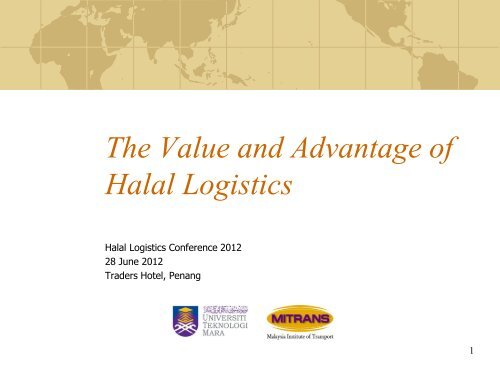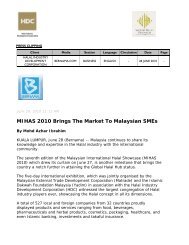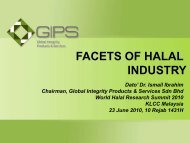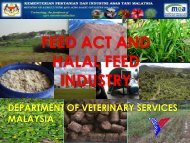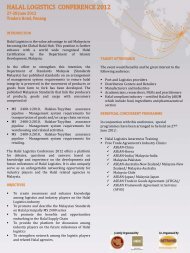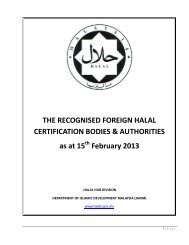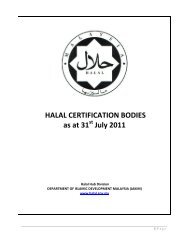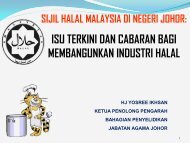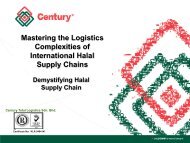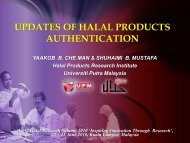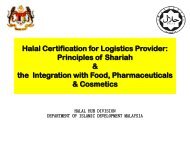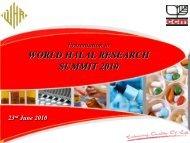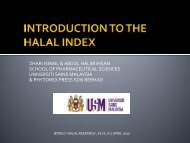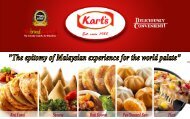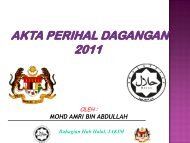The Value and Advantage of Halal Logistics - hdc
The Value and Advantage of Halal Logistics - hdc
The Value and Advantage of Halal Logistics - hdc
- No tags were found...
You also want an ePaper? Increase the reach of your titles
YUMPU automatically turns print PDFs into web optimized ePapers that Google loves.
<strong>The</strong> <strong>Value</strong> <strong>and</strong> <strong>Advantage</strong> <strong>of</strong><strong>Halal</strong> <strong>Logistics</strong><strong>Halal</strong> <strong>Logistics</strong> Conference 201228 June 2012Traders Hotel, Penang1
1About MITRANS2Introduction & Definition <strong>of</strong> <strong>Halal</strong> <strong>Logistics</strong>34Underst<strong>and</strong>ing the Concept <strong>of</strong> <strong>Halal</strong> <strong>Logistics</strong> Throughout the SupplyChain Process<strong>The</strong> Importance <strong>of</strong> <strong>Halal</strong> <strong>Logistics</strong>5Road to <strong>Halal</strong> <strong>Logistics</strong>: <strong>The</strong> Way ForwardMaterial for Training Purposes Only 2
History <strong>of</strong> MITRANS2012 – MITRANS participated in variouscorporate tenders for transport <strong>and</strong>logistics projectsSeptember 2011 – <strong>Halal</strong> TrainingProgramme for KLAS Kargo formulated<strong>and</strong> audited by MOHE2009 – MOHE MLC Research grant throughMOHE - RM5 m plus annual grant <strong>of</strong> RM 1 muntil 20152005 – Internationalization - MITRANSEU Asia Link Project TRANSLINK2003 – Upgraded to a full institutenamed MITRANS1996 – MacTRANS placed directly underITM’s Director’s OfficeJuly 2011 M.Sc <strong>and</strong> Ph.D programmescode (LT) approved.May 2011 – <strong>Halal</strong> <strong>Logistics</strong> trainingprogramme for JAKIM auditors1982 – Pusat Pengajian PengangkutanMalaysia (PPPM) was established.Material for Training Purposes Only 31982 2006 Current
VISIONTo become a leading institute intransportation <strong>and</strong> logisticsknowledge.MISSIONTo serve as a pr<strong>of</strong>essional centre <strong>of</strong> excellence instrategic transportation <strong>and</strong> logistics planning <strong>and</strong>development.Material for Training Purposes Only 4
MITRANS Objective<strong>The</strong> Malaysia Institute <strong>of</strong> Transport (MITRANS) at UniversitiTeknologi MARA (UiTM) is the nation’s centre for transportationresearch, logistics planning, consultancy <strong>and</strong> training. MITRANS has astrong history <strong>of</strong> research excellence in the fields <strong>of</strong> transport <strong>and</strong>logistics <strong>and</strong> supply chain, maritime, urban <strong>and</strong> rural transportation,intelligent transport systems, highway <strong>and</strong> traffic engineering. Buildingon UiTM’s breadth <strong>of</strong> scholarship <strong>and</strong> entrepreneurial heritage, weare engaged in multidisciplinary research, consultancy <strong>and</strong> training thataddresses real world challenges in the transportation industry todayMaterial for Training Purposes Only 5
<strong>The</strong> Principles <strong>of</strong> <strong>Halal</strong>an ToyyibanTo uphold the <strong>Halal</strong> integrity <strong>of</strong> goods across thesupply chain from farm to forkTo avoid cross contamination between goods h<strong>and</strong>leTo ensure products are safe for consumption6
<strong>Halal</strong> <strong>Logistics</strong><strong>Halal</strong> logistics is the process <strong>of</strong> managing the procurement, movement,storage <strong>and</strong> h<strong>and</strong>ling <strong>of</strong> materials, parts livestock <strong>and</strong> (semi) finishedinventory both food <strong>and</strong> non-food (<strong>and</strong> related information &documentation flows) through the organization <strong>and</strong> the supply chain incompliance with the general principles <strong>of</strong> Shariah Law.<strong>The</strong> main objective <strong>of</strong> <strong>Halal</strong> <strong>Logistics</strong> is to ensure the <strong>Halal</strong> Integrity <strong>of</strong><strong>Halal</strong> products for the end-consumer. <strong>Halal</strong> <strong>Logistics</strong> can be defined as:"<strong>The</strong> Comm<strong>and</strong> & Control <strong>of</strong> goods flows in a value system in such asway that the <strong>Halal</strong> integrity is secured throughout the supply chain.“Knowledge on <strong>Halal</strong> <strong>Logistics</strong> is important in establishing a <strong>Halal</strong>compliant supply chain by design.7
Areas <strong>of</strong> <strong>Halal</strong> <strong>Logistics</strong><strong>Halal</strong> <strong>Logistics</strong>Hub<strong>Halal</strong> <strong>Logistics</strong>Transport<strong>Halal</strong> <strong>Logistics</strong>Route<strong>Halal</strong> <strong>Logistics</strong>ManagementDedicated storage /warehouse in assistingdistribution frommanufacturer to globalcustomerDedicated liner / transportfor halal products to avoidcross contaminationduring transportationDedicated route inlinking supplier to thecustomer for fasterturnaroundSupervise all aspects <strong>of</strong>halal supply chain <strong>of</strong>manufacturer ordistributor <strong>and</strong> act assolution & informationservice provider8
<strong>The</strong> <strong>Halal</strong> <strong>Value</strong> ChainProductionProcessing &Packaging Storage Retail<strong>Halal</strong> <strong>Logistics</strong> ManagementCONSUMER9
1. Receivecustomer’sinstruction/order2. Arrangetransportation unitaccording tocustomer’srequest3. Transportationunit leaves depotto designatedlocation4. Arrival at locationcommence toloading/unloading <strong>of</strong>customer’s goods5. Arrival at locationwhere customer’sgoods to bedelivered.Loading/unloadingcustomer’s goods<strong>Halal</strong> Transportation Process7. Transport unitreturn to depot6. Additional pickup<strong>and</strong> drop-<strong>of</strong>f points10
1.Receiving/unloading- Unload fromsupplier’s vehicle-Shift materials toinspection area.2. Inspection- Ensure compliance withspecifications base onpurchase orders.-Count material <strong>and</strong>check against shippinginvoice. Report on status<strong>of</strong> count to inventorycontrol. Note anydiscrepancies.3. Storage- Move incomingsupplies to specialpicking location<strong>and</strong>/or storagelocation4. Replenishment- Move supplies fromstorage location tospecial picking location5. Order picking- Select items fromspecial picking locationor storage based on thepick list<strong>Halal</strong>WarehousingProcess9. Shipping/loading-Load outbound carrier<strong>and</strong> report to inventorycontrol.8. Staging-Arrange ordersaccording to customer<strong>and</strong>/or carrier that willtransport products7. PackingPackage orders forcustomers; mark orlabel containers thathold customer orders6. CheckingCheck picked orders foraccuracy <strong>of</strong> item,quantity, <strong>and</strong> condition;compare quantity,quality, labeling, <strong>and</strong>address with customer’sorder to ensurecompliance.11
1. Products <strong>and</strong>/orgoods received fromdistribution centre<strong>and</strong> storage products<strong>and</strong>/or goods.2. Products <strong>and</strong>/or goodsprocessing:-Identification, segregation,h<strong>and</strong>ling <strong>and</strong> labelling-Unloading to storage location3. Shelf display/ Storage- Identification, segregation,h<strong>and</strong>ling <strong>and</strong> labelling toprevent crosscontamination4. Check out-Identification, segregation,h<strong>and</strong>ling <strong>and</strong> labelling toprevent contamination-Break-bulking, sorting <strong>and</strong>repacking-Storage for frozen <strong>and</strong> chilledproducts-Storage at general cargo (forambient products)5. End user/Consumer<strong>Halal</strong> Retailing Process12
<strong>Halal</strong> ServicesBesides merch<strong>and</strong>ise, <strong>Halal</strong> services are also an important component<strong>of</strong> the <strong>Halal</strong> market:-Islamic BankingSecurities & BondsTravel & TourismSupply Chain & <strong>Logistics</strong>Education & TrainingFood ServicesEntertainmentInformation Technology<strong>Halal</strong> logistics is significant to ensure that <strong>Halal</strong> products remain asHALAL throughout the supply chain – ‘From farm to fork’.13
Overview <strong>of</strong> the <strong>Halal</strong> Industry<strong>The</strong> world <strong>Halal</strong> food industry estimated to increase to USD670billion in 2012 from USD635 billion in 2009 (Source: WHF)With the growth <strong>of</strong> global economy <strong>and</strong> increase in consumerbuying powers <strong>and</strong> awareness, the dem<strong>and</strong> for <strong>Halal</strong> productswill also grow.<strong>Halal</strong> industry has become the main alternative not only forMuslim but also for non-Muslim consumers.14
<strong>Halal</strong> Initiatives in MalaysiaThrough one <strong>of</strong> the Government’s plan for the development <strong>of</strong>the industry in IMP3, the objective has incurred Malaysia as theglobal <strong>Halal</strong> hub for production <strong>and</strong> trade merch<strong>and</strong>ize <strong>and</strong><strong>Halal</strong> services such as logistics.<strong>Halal</strong> industry basically do not only focus to halal food productonly like those understood previously; it include services sectorsuch as logistics, packaging, br<strong>and</strong>ing, <strong>and</strong> market. It alsoinclude pharmaceutical products, self adornment <strong>and</strong> cosmetic,finance, entertainment, investment, tourism, etc.15
Current Scenario <strong>of</strong> <strong>Halal</strong> Products SupplyChainRaw materials for <strong>Halal</strong> products are sourced globally with lack <strong>of</strong>traceability.Legal status <strong>and</strong> protection <strong>of</strong> <strong>Halal</strong> <strong>of</strong>ten missing.Expected <strong>Halal</strong> st<strong>and</strong>ards <strong>and</strong> procedures are not applied throughoutthe supply chain.Inaccurate LabellingMultiple <strong>and</strong> various certification bodiesNo proper segregation <strong>of</strong> products within the supply chain.16
Potential World <strong>Halal</strong> MarketUSD580 billionUSD2.1 trillionUSD900 million– Annual global market value for <strong>Halal</strong> food trade– Annual global market value for entire <strong>Halal</strong> trade– Annual retail sales <strong>of</strong> <strong>Halal</strong> meat in the United Kingdom1.6 billion – Present global Muslim population (20% <strong>of</strong> total worldpopulation <strong>of</strong> 8.2 billion)1 billion – Muslim population in Asia3 billion – Estimated global Muslim population in 2010Source: 3 rd Industrial Master Plan (IMP3 2006 – 2020)17
Market OverviewFrom a market perspective, the traditional major target markets remainin Asia <strong>and</strong> the Middle East countries. However, there are influentialdeveloping <strong>Halal</strong> markets in the UK, Europe <strong>and</strong> the USA withsignificant market size.<strong>The</strong> developing <strong>Halal</strong> markets <strong>of</strong> Europe <strong>and</strong> the US play an interestingrole, because they are markets that also play defining roles in othermarkets around the worldAs the dynamics within the Muslim world change, <strong>and</strong> globalizationtrends continue to shape people’s tastes, habit <strong>and</strong> spending patternsacross the world, we are likely to see moves in the developing <strong>Halal</strong>markets having increasingly influential roles in the established markets<strong>of</strong> the Middle East <strong>and</strong> Asia.18
Market Review – Northern AfricaNorthern African countries accounted more than 90% Muslims <strong>and</strong>ready market for <strong>Halal</strong> products.Need to create more awareness on <strong>Halal</strong> st<strong>and</strong>ards <strong>and</strong> certifications.Currently there are no specific <strong>Halal</strong> st<strong>and</strong>ards or certification in thesecountries19
Market Review – Other Parts <strong>of</strong> AfricaAlthough South Africa is a small market but is an important market for<strong>Halal</strong> products. It has four <strong>Halal</strong> Certification bodies with variousst<strong>and</strong>ards.Muslims population in South Africa are very particular on <strong>Halal</strong>ness <strong>of</strong>every products <strong>and</strong> thus there is a ready market for <strong>Halal</strong> products.Although there is a huge Muslim population in Western <strong>and</strong> EasternAfrica, the <strong>Halal</strong> market is still not developed.<strong>Halal</strong> st<strong>and</strong>ards <strong>and</strong> Certification are not available in this part <strong>of</strong> theworld20
Market Review – West Asia (Turkey, SaudiArabia, Iraq, Syria, Yemen, UAE)West Asia is a ready market for <strong>Halal</strong> products <strong>and</strong> services.Although there are no specific <strong>Halal</strong> st<strong>and</strong>ards in these countries, allproducts imported or manufactured locally must be <strong>Halal</strong> (whethercertified or not).Most <strong>of</strong> the countries are open for imported products <strong>and</strong> as suchthere is intense competition.In the case <strong>of</strong> Turkey, it is already promoting itself as the <strong>Halal</strong>gateway to Europe <strong>and</strong> are coming with its own st<strong>and</strong>ards <strong>and</strong>certification.21
Market Review – South Central Asia (India,Bangladesh, Pakistan, Turkmenistan,Kyrgyzstan)South Central Asia is a massive untapped market.Most are Muslim countries but without any <strong>Halal</strong> st<strong>and</strong>ards orcertification.22
Market Review – ASEANASEAN countries are one <strong>of</strong> the world’s leading suppliers <strong>and</strong>also importers <strong>of</strong> <strong>Halal</strong> certified products in the world. Althoughthese countries compete in the international front, there hasbeen substantial trading in <strong>Halal</strong> products among them. Forexample, Indonesia is the biggest buyer <strong>of</strong> Malaysian <strong>Halal</strong> food<strong>and</strong> Thail<strong>and</strong> is the largest <strong>Halal</strong> certified productsmanufacturers in the region.China is a huge <strong>and</strong> untapped market for <strong>Halal</strong> products <strong>and</strong>services.23
Market Review – North AmericanA market <strong>of</strong> 7.0 million Muslims who are looking for <strong>Halal</strong>products. However, <strong>Halal</strong> products are not readily available inthis market.24
Market Review – EuropeanA relatively small market but a serious market with highpurchasing powerRussia <strong>and</strong> other markets – need to create awareness25
<strong>Advantage</strong> <strong>of</strong> <strong>Halal</strong> <strong>Value</strong> ChainPure hygiene <strong>and</strong> sanitation procedures for manufacturers <strong>and</strong> serviceproviders.Provides traceability <strong>of</strong> products through close monitoring <strong>and</strong> controlConsistent with GMP <strong>and</strong> HACCP which ensure products are safe <strong>and</strong>‘Toyyib’Worldwide acceptance <strong>of</strong> <strong>Halal</strong> lifestyle – personal hygiene <strong>and</strong> healthst<strong>and</strong>ardsAssures safer <strong>and</strong> higher quality products through various controls <strong>and</strong>procedures26
Justification for <strong>Halal</strong> Products <strong>and</strong> Services<strong>Halal</strong> is more <strong>and</strong> more a complete range <strong>of</strong> product <strong>of</strong>fering in supermarketschains worldwide, as well as in 5-star hotels <strong>and</strong> restaurants <strong>and</strong> fast foodchains, airline meals, school dinners, military <strong>and</strong> even prison rations.We see this phenomena applying not only on food items. Personal hygiene <strong>and</strong>healthcare products, toiletries <strong>and</strong> cosmetics are all appearing as <strong>Halal</strong> options.Once <strong>Halal</strong> is understood as a lifestyle choice, the range <strong>of</strong> option increasesexponentially.Because with the movement <strong>of</strong> <strong>Halal</strong> products around the world, the increase inawareness <strong>of</strong> <strong>Halal</strong> in general, <strong>and</strong> in turn added value surrounding <strong>Halal</strong>, <strong>and</strong> <strong>of</strong>the holistic <strong>and</strong> interdependence <strong>of</strong> the entire <strong>Halal</strong> value chain, we are seeingentirely new sectors emerging, relating to <strong>Halal</strong> logistics, security, auditing <strong>and</strong>industrial development.27
Justification for <strong>Halal</strong> Products <strong>and</strong> Services –cont’dWith major investment in <strong>Halal</strong> production <strong>and</strong> manufacture at one end<strong>of</strong> the chain, <strong>and</strong> major investment in the retail sector at the other end,maintaining the integrity <strong>of</strong> the <strong>Halal</strong> chain at all points in between isbecoming increasingly important.<strong>The</strong> <strong>Halal</strong> integrity in the h<strong>and</strong>ling, storage, warehousing, <strong>and</strong>transportation by road, sea <strong>and</strong> air <strong>of</strong> <strong>Halal</strong> certified products, <strong>and</strong> alsodedicated <strong>Halal</strong>-certified zones are fast becoming a reality.<strong>The</strong> creation <strong>of</strong> controlled <strong>Halal</strong> – only industrial food parks, free zones,DistriParks will be part <strong>of</strong> the future <strong>of</strong> this <strong>Halal</strong> industry. As themarket dem<strong>and</strong> continues to increase, more links in the supply chainwill be created.28
Preserving <strong>Halal</strong> Integrity in Supply Chain<strong>Halal</strong> supply chain problems are not only limited to the western <strong>and</strong>non-Muslim countries. It affects all countries <strong>and</strong> is a global issues.<strong>Halal</strong> is a major industry <strong>and</strong> producers as well as service providersmust take control <strong>of</strong> the <strong>Halal</strong> Supply Chain.It is not sufficient <strong>and</strong> acceptable to label products ‘<strong>Halal</strong>’. Strictcontrol <strong>and</strong> audit procedures must be in place to ensure <strong>Halal</strong> Integrity.Full supervision <strong>of</strong> trained <strong>Halal</strong> auditors in production facilities is vitalfor <strong>Halal</strong> Integrity.29
Opportunities<strong>The</strong>re are almost 3 billion Muslim consumers <strong>of</strong> <strong>Halal</strong> products in the world.<strong>The</strong> number is increasing rapidly. With increasing awareness, more <strong>and</strong> morecountries are requesting for <strong>Halal</strong> certified products. <strong>The</strong> dem<strong>and</strong> from non-Muslims are also increasing.More <strong>and</strong> more Supermarkets <strong>and</strong> Hypermarkets are adding <strong>Halal</strong> Shelves toattract ethnic Muslim population in non-Muslim countries. For exampleTESCO in UK <strong>and</strong> CARREFOUR in France.Around 80% <strong>of</strong> the <strong>Halal</strong> food industry is in the h<strong>and</strong>s <strong>of</strong> non-Muslims. <strong>The</strong>Brazilians have been big halal producers for decades. Three-quarters <strong>of</strong>chickens exported by France are halal.30
Conclusion<strong>Halal</strong> is on the move.It is being reborn into the age <strong>of</strong> globalization, <strong>and</strong> indeed,globalization suits the nature <strong>and</strong> quality <strong>of</strong> <strong>Halal</strong>.<strong>Halal</strong> is made to be global.<strong>Halal</strong> is for everyone.31
Thank you for your kindattention32
Q&A Session33


